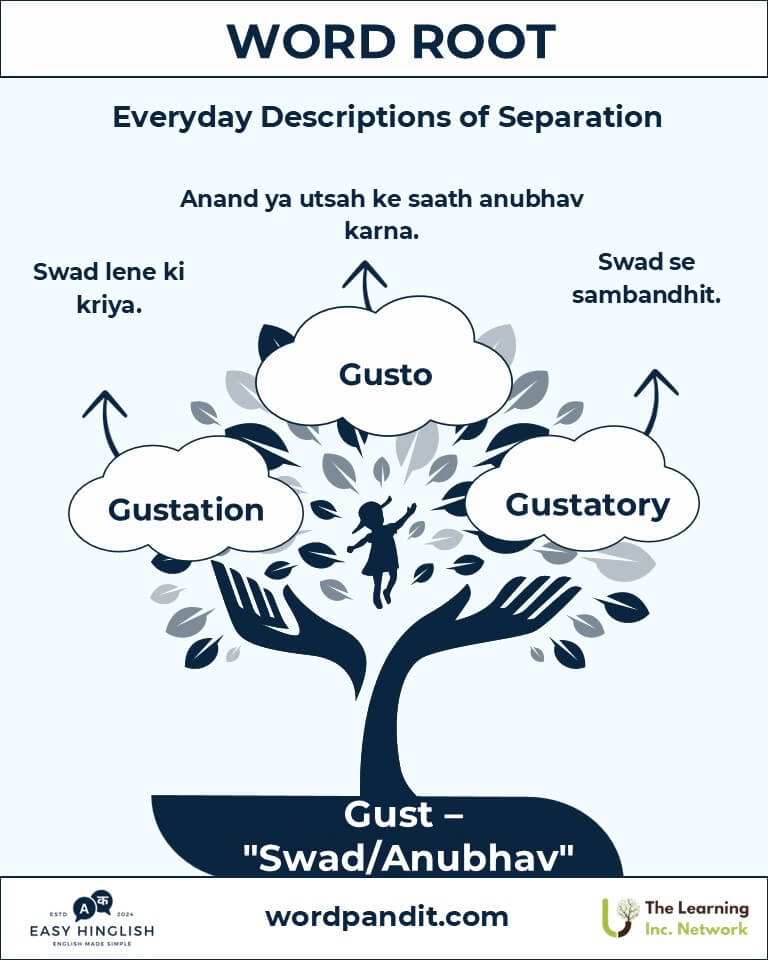Gust: The Root of Taste in Language and Perception
(स्वाद और भावना से जुड़ा Gust रूट)
Discover the sensory richness of the root "gust," derived from the Latin word "gustus," meaning "taste" (स्वाद). Words like "gustation" (स्वादन) and "disgust" (घृणा) showcase both aspects of this root—enjoyment (आनंद) and aversion (घृणा). This root captures both sensory and emotional responses.

Table of Contents
- Introduction: The Essence of Gust
- Etymology and Historical Journey
- Mnemonic: Unlocking the Power of Gust
- Common Gust-Related Terms
- Gust Through Time
- Gust in Specialized Fields
- Illustrative Story: Gust in Action
- Cultural Significance of the Gust Root
- The Gust Family Tree
- FAQs About the Gust Word Root
- Test Your Knowledge: Gust Mastery Quiz
- Conclusion: The Lingering Legacy of Gust
Introduction: The Essence of Gust
(Gust का मूल अर्थ)
"Gust" (pronounced: guhst) is a linguistic gateway to the world of sensory perception and emotional reaction. Derived from the Latin "gustus," it means "taste" (स्वाद). Words related to "gust" capture both sensory delight and visceral distaste. Whether it’s "gustatory" (स्वाद से जुड़ा) exploration or "disgust" (घृणा), this root highlights the interplay between sensory perception and emotional responses.

Etymology and Historical Journey
(Gust की उत्पत्ति और इतिहास)
The root "gust" originates from Latin, where "gustus" meant "the act of tasting" or "savoring" (स्वाद लेना). It entered English through Old French during the Middle Ages. Initially, it was limited to physical taste, but later, its metaphorical use expanded to describe aesthetic (सौंदर्य) and emotional inclinations (भावनात्मक झुकाव).
- "A gust of wind" (तेज हवा का झोंका): Represents intensity.
- "Disgust" (घृणा): Represents repulsion.
Mnemonic: Unlocking the Power of Gust
(Mnemonic के ज़रिए Gust को याद रखें)
Imagine a chef tasting a spoonful of soup and reacting dramatically—either with delight or disgust. This scene helps link "Gust" to both sensory and emotional experiences.
Mnemonic Device: "Gust brings flavor to life—whether sweet, savory, or sour!"
Common Gust-Related Terms
(Gust से जुड़े आम शब्द और उनके अर्थ)
- Gustation: The act or sense of tasting.
Example: "Gustation is crucial for chefs to perfect recipes." - Disgust: A strong feeling of aversion or revulsion.
Example: "She felt disgust after smelling spoiled food." - Gustatory: Relating to the sense of taste.
Example: "The meal provided an unforgettable gustatory experience." - Gusto: Enthusiastic enjoyment or vigor.
Example: "He ate the pizza with great gusto." - Gust: A strong burst of wind or sudden surge of feeling.
Example: "A gust of wind nearly knocked her over."
Gust Through Time
(समय के साथ Gust का सफर)
- Gustatory (Ancient to Modern): Initially connected only to "taste," this term has become a mainstay in scientific discussions.
- Disgust (Evolved Usage): Originally used for bad tastes or smells, it now describes emotional and moral repulsion.
Gust in Specialized Fields
(विशिष्ट क्षेत्रों में Gust का उपयोग)
- Medicine:
- Gustatory Pathways: Neural pathways responsible for taste perception.
- Example: "Damage to gustatory nerves can impair taste."
- Psychology:
- Disgust Response: A primal reaction linked to morality and survival instincts.
- Example: "The disgust response helps prevent exposure to toxins."
- Literature:
- Gusto in Writing: Describes enthusiasm and vivid energy.
- Example: "His prose was filled with gusto, captivating the readers."
Illustrative Story: Gust in Action
(एक कहानी जो Gust का महत्व दिखाती है)
Sofia, a culinary student, was preparing her final project: creating a dish that would delight all five senses. Using her gustatory skills, she adjusted flavors carefully. One day, her mentor expressed disgust at her overly salty broth, pushing her to improve. When she presented her final dish, the judges applauded. This story demonstrates how "gust" connects sensory and emotional experiences.
Cultural Significance of the Gust Root
(Gust का सांस्कृतिक महत्व)
The word "gust" reflects humanity's universal connection to taste and emotion. Every culture values food and flavor as an essential part of identity. "Disgust" also plays a role in defining moral and social boundaries.

The Gust Family Tree
(Gust परिवार के संबंधित शब्द)
- Sap- (Latin: "taste")
- Sapid: Having a strong or pleasant taste.
Example: "The soup was highly sapid, bursting with flavor."
- Sapid: Having a strong or pleasant taste.
- Sav- (French: "taste, savor")
- Savory: Something morally acceptable or pleasant-tasting.
Example: "The savory aroma filled the kitchen."
- Savory: Something morally acceptable or pleasant-tasting.
- Tac- (Latin: "to touch")
- Tactile: Related to touch but metaphorically connected to taste.
Example: "The dish’s tactile sensation enhanced its gustatory experience."
- Tactile: Related to touch but metaphorically connected to taste.

FAQs About the Gust Word Root
Q: "Gust" ka kya matlab hai?
A: "Gust" ka origin Latin word "gustus" se hai, jiska matlab hai "taste" (स्वाद). Yeh root sensory aur emotional reactions ko express karta hai jaise "gustation" (स्वादन) aur "disgust" (घृणा).
Q: "Gustatory" ka kya arth hai aur yeh kahan use hota hai?
A: "Gustatory" ka matlab hai taste se related. Example: Gustatory nerves taste sensations ko brain tak transmit karte hain. Culinary arts mein, yeh term flavors aur textures ke sensory pleasure ko highlight karta hai.
Q: "Disgust" word ka origin kya hai?
A: "Disgust" Latin prefix "dis-" (apart) aur "gustus" (taste) se bana hai. Pehle yeh bad-tasting food ke liye use hota tha, lekin ab yeh metaphorical ho gaya hai, jo moral aur emotional repulsion ko express karta hai.
Q: "Gusto" aur "Gust" mein kya sambandh hai?
A: "Gusto" ka origin bhi "gustus" se hai. Pehle iska matlab tha literal taste, lekin ab yeh enthusiasm aur zest (उत्साह) ko symbolize karta hai.
Example: "Woh apna kaam great gusto ke saath karta hai."
Q: "Gust" ka kya aur matlab ho sakta hai?
A: Taste ke alawa, "gust" sudden burst of wind ya emotion ko bhi dikhata hai.
Example: "A gust of laughter" ek intense aur sudden reaction ko describe karta hai.
Q: "Gustation" ka sensory science mein kya role hai?
A: Gustation ek scientific term hai jo taste sensation ke act ya sense ko describe karta hai. Yeh taste buds aur brain ke beech ke connection ko represent karta hai jo flavor perceptions create karta hai.
Q: "Disgust" psychology mein kahan fit hota hai?
A: Psychology mein, "disgust" ek primal emotion hai jo harmful substances, jaise spoiled food, ke exposure se bachne ke liye evolve hui. Iska social aspect bhi hai, jo moral disapproval ya cultural taboos ko signify karta hai.
Q: "Gust" root language ke liye kyun important hai?
A: "Gust" root sensory aur emotional worlds ke beech ki richness dikhata hai. Isse jude words physical sensations aur metaphorical concepts ko combine karte hain.
Q: "Gustatory" aur "Olfactory" mein kya difference hai?
A: "Gustatory" taste se related hai, jabki "olfactory" smell se. Yeh dono senses aksar ek saath kaam karte hain, kyunki smell ka flavor perception par bada asar hota hai.
Test Your Knowledge: Gust Mastery Quiz
1. "Gust" ka kya matlab hai?
2. Kaunsa term taste sense ko describe karta hai?
3. "Disgust" originally kya describe karta tha?
4. Enthusiasm ya vigor ko dikhane wala word kaunsa hai?
5. "Gustation" culinary arts mein kaise relevant hai?
Conclusion: The Lingering Legacy of Gust
(Gust की छुपी हुई विरासत)
The "Gust" root symbolizes the intricate relationship between sensory and emotional perception. From gustatory delights to disgust, this root reminds us how taste influences experiences and expressions. As we deepen our understanding of sensory perception, "Gust" continues to add flavor to our language.








